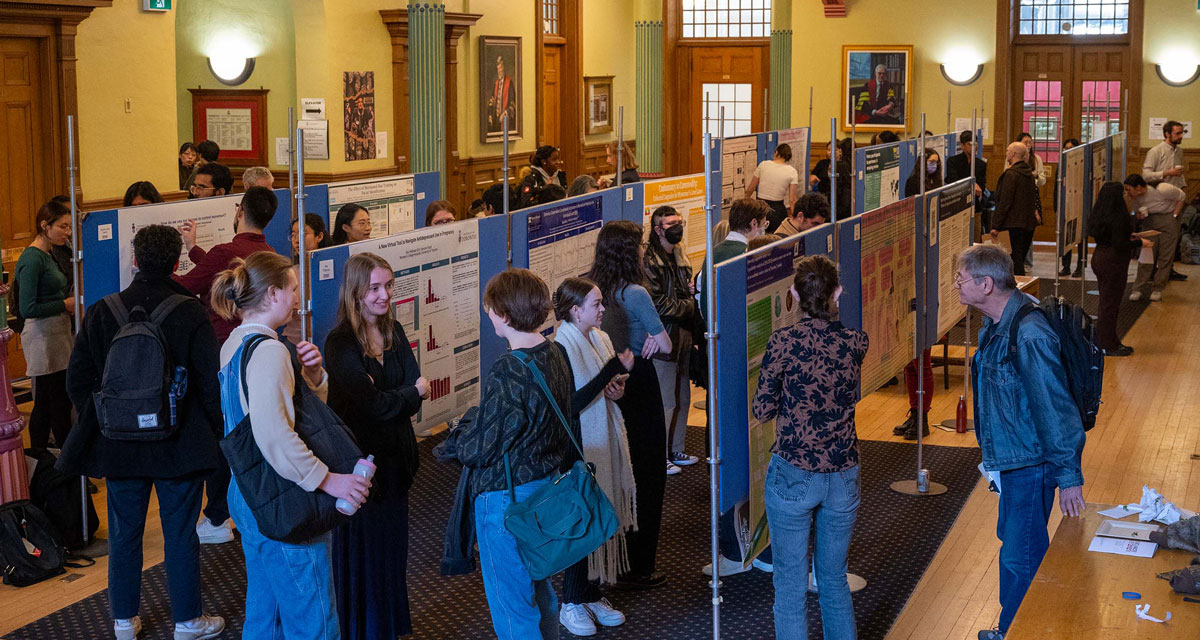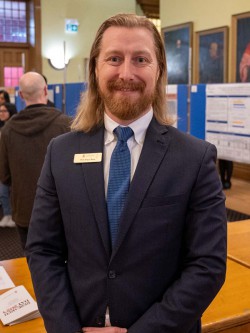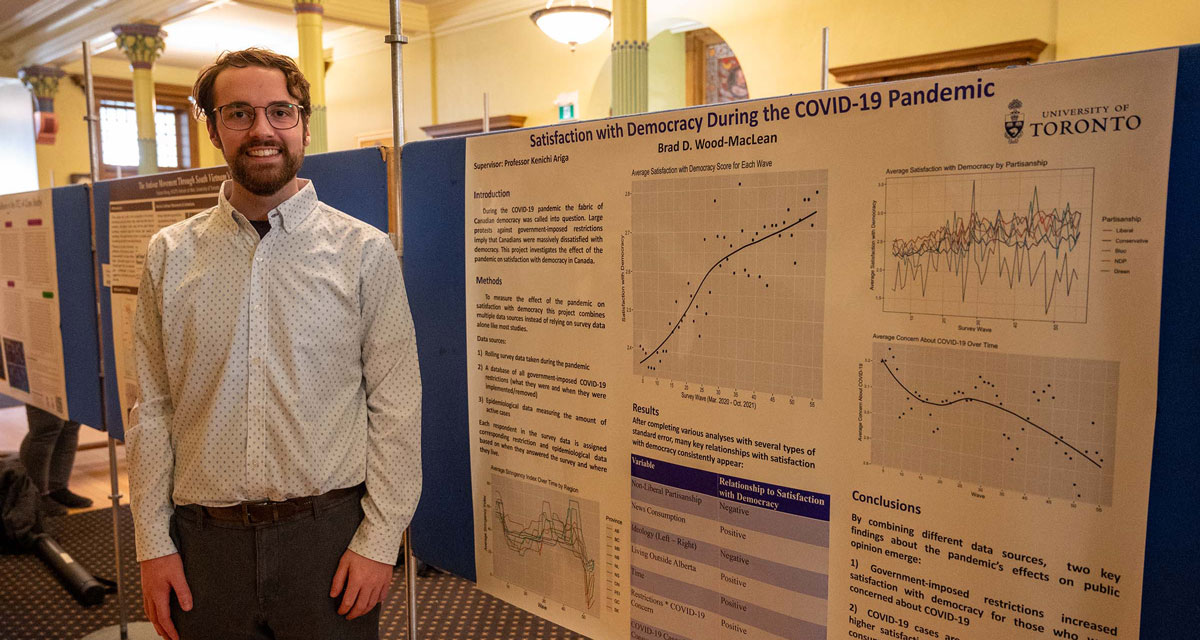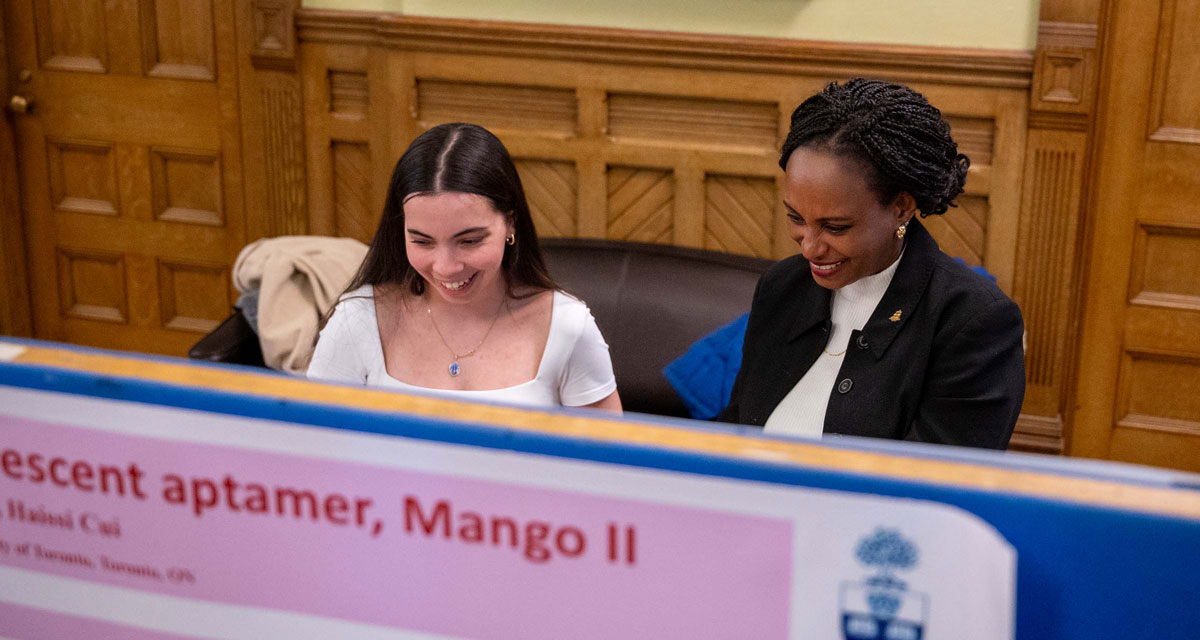Victoria College Research Day Highlights Undergraduates' Achievements

Visitors examine the array of Research Day posters displayed in the foyer of the Old Vic Building on March 25, 2024. (Photos by Minh Truong)
By Dan Blackwell
Increasingly, undergraduate students aren’t just receiving knowledge but producing it and playing an integral part in Victoria University and U of T's roles as leading research institutes.
This was one of the key takeaways from last week’s Research Day, an annual undergraduate research event hosted at Victoria College. The day allows undergraduate students at Vic to showcase their research to peers and faculty members and features a capstone symposium, awards ceremony and keynote lecture. The research conducted by this year's award recipients covered a wide array of topics, ranging from antidepressant use during pregnancy to antiwar activism in South Vietnam during the 60s and 70s.
Professor Shaun Ross, Research Day organizer and co-ordinator of undergraduate research at Victoria College, says that interest in the event has grown steadily. He estimates there has been a 60 to 70 percent increase in student research submissions since 2022, with this year's event receiving more submissions than ever before.

Professor Shaun Ross.
“There has been real growth, both in our panel discussions and the amount of student research submissions," he says. "In terms of accepting the posters for presentation, the decisions were really tough this year."
Ross believes that the growth of the event can in part be attributed to Victoria University's dedication to top-notch research, and its emphasis on undergraduates taking centre stage in driving innovation.
“Students may come to Victoria University or U of T because of its research reputation, but it’s not often acknowledged how much undergraduates are a part of the research mission of the University,” he says.
"Undergrads work in labs or serve as collaborators and sounding boards for faculty research projects, and what you see on display here today represents the best of these students and their cutting-edge research."
Vic U President Dr. Rhonda N. McEwen says research is a pivotal part of the curriculum offered to undergraduates at Victoria College.
“Research wakes up that curiosity to learn,” she says. “Everybody talks about the importance of critical thinking, and there is no better way to grow that and encourage that in a student than through research.”
As a researcher herself, McEwen says Research Day brings back fond memories of her own experiences as a student, while still providing opportunities and challenges unlike anywhere else.
“I could close my eyes and see myself as a master's student doing something like this, but never as an undergrad,” she says. “I’m always blown away by the quality of work on display here. I’m amazed we have undergrads doing research at this level.”
Fourth-year Vic student Brad Wood-MacLean, who showcased his senior thesis on how the COVID-19 pandemic impacted satisfaction with democracy in Canada, says the fun part about Research Day is the challenge it presents.

Brad Wood-Maclean's thesis research combines public opinion survey data, a database of government-imposed COVID-19 restrictions and epidemiological data to determine how the pandemic impacted Canadians' satisfaction with democracy.
“You’re condensing an entire thesis into just one poster. It’s tough,” he says. “Realistically, nobody is going to read a giant 60-page document. At an interdisciplinary undergraduate event like this, you’re forced to learn how to communicate your ideas more practically and efficiently.”
Vic student Grace Nolasco, a fourth-year studying human biology, presented her thesis work on genome editing strategies (CRISPR-Cas9) used to correct genetic mutations seen in Duchenne muscular dystrophy patients. Nolasco received this year’s Principal’s Science Prize award and says that while she has participated in poster presentations in the past, Research Day is unique.

Grace Noralco (left) hopes her thesis research will someday play a role in offering a safe and efficient therapy for patients with muscular dystrophy.
“I’m used to presenting my work to a much more scientific audience,” she says. “As challenging as it is to present your work in great scientific detail to your peers, it’s also really challenging to simplify what you’ve learned.”
Nolasco says participating in Research Day can pay dividends down the road.
“At the end of the day, you may be breaking down your findings for patients to consider using as a therapy, and getting into the nitty-gritty details may confuse them,” she says. “It’s extremely important to make our findings comprehensible for somebody without any scientific knowledge.”
President McEwen says that these types of learning experiences make Research Day invaluable and that research will continue to be a cornerstone of her vision for the University's future.
“I want research to be one of the things that Victoria College and Emmanuel College are known for,” she says.
“To do that means we have to elevate the research already happening here and make it more visible. Research Day is one way to have people come out and engage.”
Want to learn how you can participate in next year’s Research Day? Interested in research opportunities at Victoria College in the University of Toronto? Contact Professor Shaun Ross, undergraduate research coordinator, at vic.research@utoronto.ca.
2024 Research Day Award Winners
Dean of Students Social Impact Awards:
- Beth Gouda, “Pride & Pressure: The Impact of EU Pressure on Serbian Pride Parades”
- Mia Feldman, “Navigating Anti-Depressant Use During Pregnancy”
- April Naing, “Customary to Commodity: Colonial Legacies in Myanmar's Land Governance”
E.J. Pratt Primary Sources Award (Humanities):
- Eunice Der, “Lost from "Oblivion"
E.J. Pratt Primary Sources Award (Social Sciences):
- Chelsea Wang, “Antiwar Activism in South Vietnam 1964-1974”
Principal’s Science Prize:
- Grace Nolasco, "Removing a Piece of the Genome to treat Duchenne Muscular Dystrophy"
Science, Technology, and Society Program Prize:
- Nina Yue, “Seeing faces: Train your facial recognition ability
Student Choice Award:
- Karina Cheung: “The Effects of Heavy-NP Shift on Tagalog Word Order Preferences”
VUSAC Student Experience & Wellbeing Award
- Lamar Elfaki “Labelling Discrepancies across Global Shelves: a Disadvantage to Canadians?”
